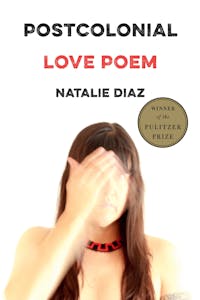Postcolonial Love Poem
Poems
 Download image
Download image
ISBN10: 1644450143
ISBN13: 9781644450147
Paperback
80 Pages
$17.00
CA$21.00
Winner of the Pulitzer Prize
National Book Award Finalist
Winner of the Audre Lorde Award for Lesbian Poetry
Finalist for an L.A. Times Book Prize
Shortlisted for the T.S. Eliot Prize
Longlisted for the Brooklyn Public Library Literary Prize
Postcolonial Love Poem is an anthem of desire against erasure. Natalie Diaz’s brilliant second collection demands that every body carried in its pages—bodies of language, land, rivers, suffering brothers, enemies, and lovers—be touched and held as beloveds. Through these poems, the wounds inflicted by America onto an indigenous people are allowed to bloom pleasure and tenderness: “Let me call my anxiety, desire, then. / Let me call it, a garden.” In this new lyrical landscape, the bodies of indigenous, Latinx, black, and brown women are simultaneously the body politic and the body ecstatic. In claiming this autonomy of desire, language is pushed to its dark edges, the astonishing dunefields and forests where pleasure and love are both grief and joy, violence and sensuality.
Diaz defies the conditions from which she writes, a nation whose creation predicated the diminishment and ultimate erasure of bodies like hers and the people she loves: “I am doing my best to not become a museum / of myself. I am doing my best to breathe in and out. // I am begging: Let me be lonely but not invisible.” Postcolonial Love Poem unravels notions of American goodness and creates something more powerful than hope—in it, a future is built, future being a matrix of the choices we make now, and in these poems, Diaz chooses love.
Reviews
Praise for Postcolonial Love Poem
“Diaz’s collection is no doubt one of the most important poetry releases in years, one to applaud for its considerable demonstration of skill, its resistance to dominant perspectives and its light wrought of desire.”—The New York Times Book Review
“The representation of violence against Native peoples is a driving engine of [Postcolonial Love Poem]. Whether it be historical or present violence against the general Native population and culture, the specific violence levied at girls and women, the violence of the Christian religion, the cyclical violence the male body engages in, a violence— sometimes loud cacophony, sometimes mute ghost—saturates these pages . . . In the very present absence of the Mojave language, Postcolonial Love Poem becomes a very present love poem to self and community, post colonialism.”—NPR.org
“This is a breakthrough collection. In a world where nothing feels so conservative as a love poem, Diaz takes the form and smashes it to smithereens, building something all her own. A kind of love poem that can allow history and culture and the anguish of ancestors to flow through and around the poet as she addresses her beloved.”—John Freeman, Literary Hub
“With Postcolonial Love Poem, Diaz brings her signature sharp, insightful, exquisite language to a collection about America, about future and past, pain and ecstasy . . . Diaz is a force, and we are all just lucky to live in a world where she writes.”—Bookmarks
“With tenacious wit, ardor, and something I can only call magnificence, Diaz speaks of the consuming need we have for one another. This is a book for any time, but especially a book for this time. These days, and who knows for how long, we can only touch a trusted small number of people. Diaz brings depth and resonance to the fact that this has always been so. Be prepared to journey down a wild river.”—Louise Erdrich
“Groundbreaking . . . Entire dissertations could be written about Diaz’s use of light and color in this book’s lithe lyrics . . . An unparalleled lyric work.”—Booklist (starred review)
“[An] exquisite, electrifying collection . . . Diaz continues to demonstrate her masterful use of language while reinventing narratives about desire.”—Publishers Weekly (starred review)

